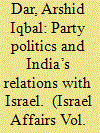| Srl | Item |
| 1 |
ID:
180087


|
|
|
|
|
| Summary/Abstract |
The rise of China and its impact on regional as well as global power structure has invited a plethora of rigorous scholarly analysis. Same has been the case for how global powers like the US in particular and its neighbours in general respond to its rise. However, if, on the one hand, the question of China’s rise has made realism and the balance of power dynamics as the cynosure of international relations (IR), the response of most of its neighbours has challenged its parsimonious ‘balancing–bandwagoning’ dichotomy. To come to the terms with new realities, scholars have come up with a new category that moves beyond this dichotomy. The new category is hedging and is hailed to be the best explanation of states behaviour when they neither balance nor bandwagon. While engaging with the extant debate on hedging in IR, this article provides a comprehensive analysis of two of China’s most affected neighbours: India and Vietnam. This article argues that not only does hedging provide the best explanation of how they respond to China, alone as well as in cooperation, but also is the most alluring option available to them. Furthermore, this article, apart from examining the driving factors of their hedging behaviour, also provides some important policy implications for policymakers of New Delhi and Hanoi in the concluding section.
|
|
|
|
|
|
|
|
|
|
|
|
|
|
|
|
| 2 |
ID:
173553


|
|
|
|
|
| Summary/Abstract |
Middle East has been and continues to be a core strategic region for US owing to its huge geo-political significance. However, since the end of Cold War, there emerged a plethora of challenges complicating US’s influential role. Iran’s expanding footprint to carve out a ‘New Persia’ is also an unwelcome development for US.
|
|
|
|
|
|
|
|
|
|
|
|
|
|
|
|
| 3 |
ID:
185262


|
|
|
|
|
| Summary/Abstract |
Indian–Israeli relations have been experiencing a ‘historic moment’ since the advent of BJP as a dominant political party in India. Owing to its open embrace of Israel, the Modi-led BJP has become the most pro-Israel government in Indian history. However, contrary to the common attribution of this momentous shift to the ‘Modi factor’, New Delhi’s relations with Israel have been shaped – and continue to be determined – by the ideologies and party positions of the country’s two largest political parties – BJP and Congress.
|
|
|
|
|
|
|
|
|
|
|
|
|
|
|
|